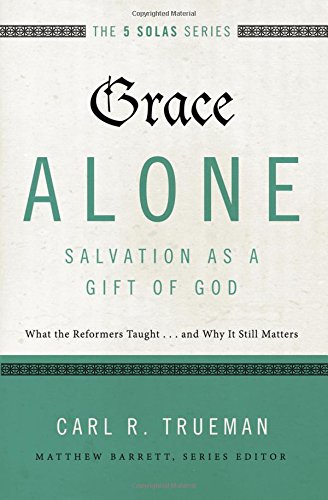“Grace alone!” Few words are more important or more precious to the gospel and to the Christian. That’s the title of the new book by Carl Trueman: Grace Alone—Salvation as a Gift of God: What the Reformers Taught…and Why It Still Matters.
Hi, I’m Fred Zaspel, Executive Editor here at Books At a Glance. Dr. Trueman is Professor of Historical Theology and Church History at Westminster Theological Seminary here in Philadelphia and a long-time friend of Books At a Glance. His book is part of Zondervan’s The Five Solas Series, and he’s here to talk to us about his new book.
Carl, welcome back – always great to talk to you.
Carl Trueman:
Great to be here, Fred.
Fred Zaspel:
Summarize for us – what is the significance of the mantra, “Grace alone”?
Trueman:
Well, I’ll put it at the most simple level: the mantra “grace alone” indicates that the reformers believed that salvation was wholly a work of God in Christ; that we contribute nothing of any decisive significance to our own salvation.
Zaspel:
Explain for us, how does this “sola” relate to the others? What is the connection between “grace alone” on the one hand, and “Christ alone” and “faith alone” on the other?
Trueman:
That’s an interesting question. I think the connection between “grace alone” and “Christ alone” is a tighter one than between “grace alone” and “faith alone.” I would say “grace alone” is in some ways another way of saying “Christ alone” because Christ is the manifestation, the embodiment, of God’s grace. He is God’s gracious action in salvation. So “grace alone” and “Christ alone” are two ways, on one level, of saying the same thing. “Grace alone” and “faith alone” is slightly more complicated, because the most obvious way in which “grace alone” manifests itself in the reformers would be in their emphasis upon God’s sovereignty in election. That is, God has decreed in eternity to act decisively to save certain people. That’s the most obvious theological implication of the “grace alone” doctrine.
Now, it’s possible, as I think I demonstrated in the book, it’s possible to be predestinarian in a thoroughly Augustinian way, and yet not hold to salvation by grace alone through faith alone. So, for example, Blaise Pascal, in the seventeenth century, a great Catholic philosopher and theologian, is a vigorous predestinarian, believes in salvation by grace alone; and yet, would believe that that salvation comes through, not so much the preaching of the Word and therefore justification by faith, but through the sacraments, through taking baptism and the Lord’s Supper. So, there is a connection in the Reformers’ minds between “grace alone” and “faith alone,” in that “faith alone” rests upon “grace alone,” but I would say is not logically required by “grace alone.”
Zaspel:
Can we say that the logic of it might hang together like this: Because Christ alone does the work of salvation, it is necessarily received by grace alone; and because it is by grace alone, and now understanding faith as simply the instrument of receiving, because it is by grace alone, it is therefore necessarily by faith alone and not works.
Trueman:
Yeah, I think one would say, when we look at the Bible’s teaching, how does one receive the righteousness of Christ? By hearing the word of God. So at that point you start to move into saying that faith alone… I would say it’s biblically required but not logically required, if I could put it that way.
Zaspel:
Explain for us why this was important and how it was a point at issue in the context of the Reformation. What did Luther and Calvin say about grace, and how did they find the teaching of the Roman Catholic Church faulty on that score.
Trueman:
Good questions. I think, first of all, why is it important? Well, it’s important, first of all because it’s… One of the odd things is – and I say this in the book – is that I think anybody who claims to be a Christian, however heretical they might be, is almost certainly going to assert that salvation is by grace alone. The question will then come down to: What do you mean by grace? I mean, Pelagius believed in salvation by grace (Fred: But he didn’t spell it the same way.) Yeah, he understood it in a way that contradicted the way the Bible understands it, as far as I can see, or that Augustine understands it.
So, when you get to the Reformation, really, all the theologians – Catholics and Protestants in the Reformation – if you sat them down in a room, or you had them on this podcast or interviewed them and said, “Do you have any problems with salvation by grace alone?” I’m betting to a man they would say, “No problem at all.” The question then becomes what does it mean. And the Reformation is, on one level, a big debate about what grace means. Does it mean that salvation is all of God, that salvation leaves nothing decisive to the human will? Or does it mean, for example, that God has graciously set it up, that the human will might have a decisive role in salvation? And it’s going on both in Protestantism and in Catholicism – huge debates about exactly what grace means.
What did Luther and Calvin have to say about grace? Well, for them, grace was the sovereignty of God in salvation, manifested in the action of the Lord Jesus Christ. Conceptually, that tracks back to their understanding of predestination in election; and it tracks forward to their understanding that faith itself, the very instrument of salvation, is something given to us by God and not something we muster up in our own strength. So, vitally important for Reformation understandings of salvation.
How did they find the Roman Catholic Church faulty on this score? I think the primary beef on that score was twofold. First of all, it was with the late medieval idea that human beings, by their own effort, could earn God’s favor. That was the primary beef. Now, not all medieval theologians believed that, but the later medieval theologians, who were particularly dominant in Luther’s life, and to some extent in Calvin’s own background, they certainly taught that.
The second issue they had was with, you might say, the means of grace. How do human beings experience God’s grace? For Luther and Calvin, it was through the proclamation of the Word. Primarily the proclamation of the Word. For the contemporary Roman Catholics they knew, it was through the Mass. So, it had both theological and liturgical/practical importance for them.
Zaspel:
You have a somewhat surprising chapter in the book about Thomas Aquinas. How is he an “ally” to the Reformers?
Trueman:
I wanted to put Thomas in for a number of reasons. One, I’m a big Thomas fan on all fronts. He did a lot of good work on the doctrine of God and things like this. And also, there’s a tendency among Protestants to… You know, we ask the question, “Well, who was maintaining the truth? Where was the church between sometime in the early church when it all went wrong, and 1517 when Martin Luther sets everything back on the right tracks?” Well, the answer is that there were men in the Middle Ages who maintained important elements of the truth. And one of the things that Thomas Aquinas does is he does maintain the Augustinian understanding of predestination. Which is conceptually vital for biblical understanding of grace. So, I included Aquinas, first and foremost, as a demonstration that in the Middle Ages not everybody was semi-Pelagian; not everybody believed that human beings could, by their own efforts, get into heaven. Thomas Aquinas clearly believed in the divine decree.
I also used him because he has some – in the summer when he deals with this – he has one or two wonderful practical points. He asks the question that we’ve all asked: “If everything’s by faith, and if God has predestined all that happens, why should we pray?” And he gives a great answer to that. Something to the effect of, “Well, God is delighted to use our prayers as the means by which he executes his predestination.” Which is a great practical, pastoral answer. I think Thomas Aquinas is often not read and often dismissed by Protestants. But, on some issues – I’m not going to send you to Aquinas to learn about the Lord’s Supper – but on the issue of predestination, Aquinas is actually one of the clearest and soundest thinkers in the history of the church.
Zaspel:
Give us a brief overview of your book so our readers can know what to expect.
Trueman:
There are three aspects of the book. First of all, I start off with a section on a survey of the Bible’s use of the language of grace and teaching on grace. Then there are a number of historical chapters. I have a chapter on Augustine’s Confessions, a chapter on the Pelagian controversy, a chapter on Thomas Aquinas, and then a couple of chapters on Luther and the Reformation. I try to give a historical survey of how grace has been understood in the church.
Then, in the second section of the book – and this is why I really wanted to write the book – I try to draw out the practical implications of a Protestant understanding of grace for church life. And I argue there that if you really have an understanding, a Reformation understanding, of God’s grace, a biblical understanding of God’s grace, then the preaching of the Word will be primary. Corporate church life will be very important to you; and you will understand the church, first and foremost, as an act of God, not something we do but something that God does. And that church will be marked by a high emphasis on the preaching of the Word, a high view of baptism. And I have to say, Fred, one of my anonymous editors was a Baptist and he complimented me on how I resisted cheap-shotting Baptists, (Fred laughing) and what a complementary account of Reformed Baptist thinking I gave on Baptists. So, if you’re a Baptist, I hope that chapter doesn’t offend you. I’ve gone out of my way to try to find something positive in your tradition, if I could put it that way.
Zaspel:
(Both men laughing.) We’ll be sure to let you know, if it’s not.
Trueman:
There’s a chapter on the Lord’s Supper, and then, finally, a chapter on prayer. And then I summarize with 10 signs that you belong to a church that takes grace seriously that I really try to summarize the last half of the book. I really wanted it to be a practical book, and I got a Baptist friend, Kent Hughes, to do the Foreword; and Kent said to me that he particularly liked the practical emphasis I tried to draw out. I hope it’s a book that… You can get books on…There are very good books written on predestination, election, and grace… If this book makes a small contribution, I hope it’s in what I say about practical church life in the second half.
Zaspel:
We’re talking to Dr. Carl Trueman, author of the new book, Grace Alone—Salvation as a Gift of God: What the Reformers Taught … and Why It Still Matters. It’s part of Zondervan’s The Five Solas Series, and a perfectly wonderful theme that is expounded very well. We encourage you to get a copy and read and enjoy!
Carl, congratulations on your book, and thanks for talking to us today.
Trueman:
Thanks for having me on, Fred.

